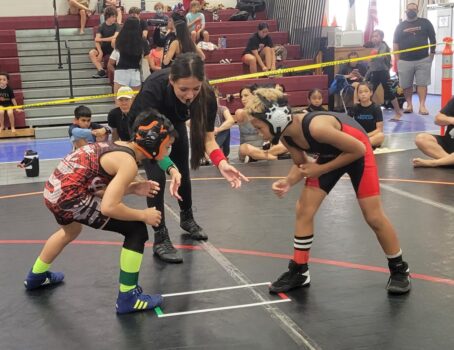—–
Like with most sports in Hawaii, wrestling has taken a direct hit from COVID-19.
And while the sport is in somewhat of a weakened condition here, it is by no means in serious trouble.
Still, the fact that there are only about seven clubs left on Oahu this spring compared to the approximately 20 in pre-COVID-19 pandemic times is a major blow to the sport in the 808.

“We’ve had about 150 competitors (each) at our two tournaments on Oahu,” said Mark Buelow, a director with the Hawaii Federation of USA Wrestling, last week before a third tourney was held over the weekend. “It used to be more like 250. And there’s been a major consolidation of clubs.”
Aside from a drop in numbers, another problem HFUSAW has been encountering is a lack of places to hold practices and competitions. Many Department of Education schools that the organization normally counts on for wrestling space are not open to community organizations during the ongoing pandemic.
So far, the three tournament sites available to HFUSAW are the Calvary Chapel of Honoulu in Aiea, the Kaiser High School gym and the outdoor venue known as The Ranch in Waimanalo.
Buelow thinks the DOE is likely to open more gyms for wrestling use as time go by, especially since many coronavirus restrictions (like the wearing of masks and strict social distancing) have been lifted by the state and city governments.
On Maui, there’s been four HFUSAW events this seasoni, and a big one is coming up Saturday there — the Hawaii USA Wrestling Folkstyle Championships (eighth grade and under) at the Lahaina Civic Center.
But after that, the schedule on Oahu is up in the air due to an inability, so far, for the HFUSAW to find venues for the final four weeks of its season, including the high school age club freestyle and Greco-Roman state championships June 11-12.
“We don’t have anything booked yet,” Buelow said.
That situation is a far cry from the pre-pandemic norm of three tournaments per month.
The HFUSAW runs two seasons per year — in the fall from October through December and then again in the spring from April to June. Those seasons bookend the official high school season (run by Hawaii’s five high school leagues and the Hawaii High School Athletic Association) that runs from December through March.
Later in June, after the state championships, the HFUSAW clubs will bring up to 60 kids to a big tournament in Utah.
The Focus Is On Growing Wrestling In Hawaii
Buelow, a teacher at Campbell and a former head coach for the Sabers who runs the Honolulu Wrestling Club-Tenri, offered his thoughts on the best way to grow wrestling in Hawaii.
“The perfect model for wrestling to be super successful in a state is when every high school has a youth program,” he said. “That houses the little kids in that community and gives them an introduction to wrestling. They learn up and that feeds the high school program down the line. We haven’t built that relationship with (all) the schools yet. Maybe there’s some red tape. A handful of schools have opened their doors to our youth programs. Schools can also benefit by doing that — with kids supporting their sports teams and also financially by hosting tournaments where the proceeds go to the athletic department.”
But relationships between schools and private clubs don’t always mesh well.
“It takes a special person to be trusted by a school to run a youth program,” Buelow said. “Ideally, you want someone who is tied to the school — a teacher. What the HFUSAW is trying to do now is create relationships with schools and let them know our organization is a legit organization run by people who are well-versed and trained in coaching philosophy.”
The cost of participation is another thing hindering the ability to get more kids signed up.
“The only option in many cases to enter our sport is through money,” Buelow said. “At my club, luckily it’s super cheap and (part of) that cost is donated to the (Tenrikyo) church. In general, the cost of wrestling weeds out a large population. It doesn’t have to be like that. The ILH has a pretty good system. In seventh and eighth grade, they have intermediate wrestling and the majority are beginners.”
—–
ALSO AT BedrockSportsHawaii.com:



